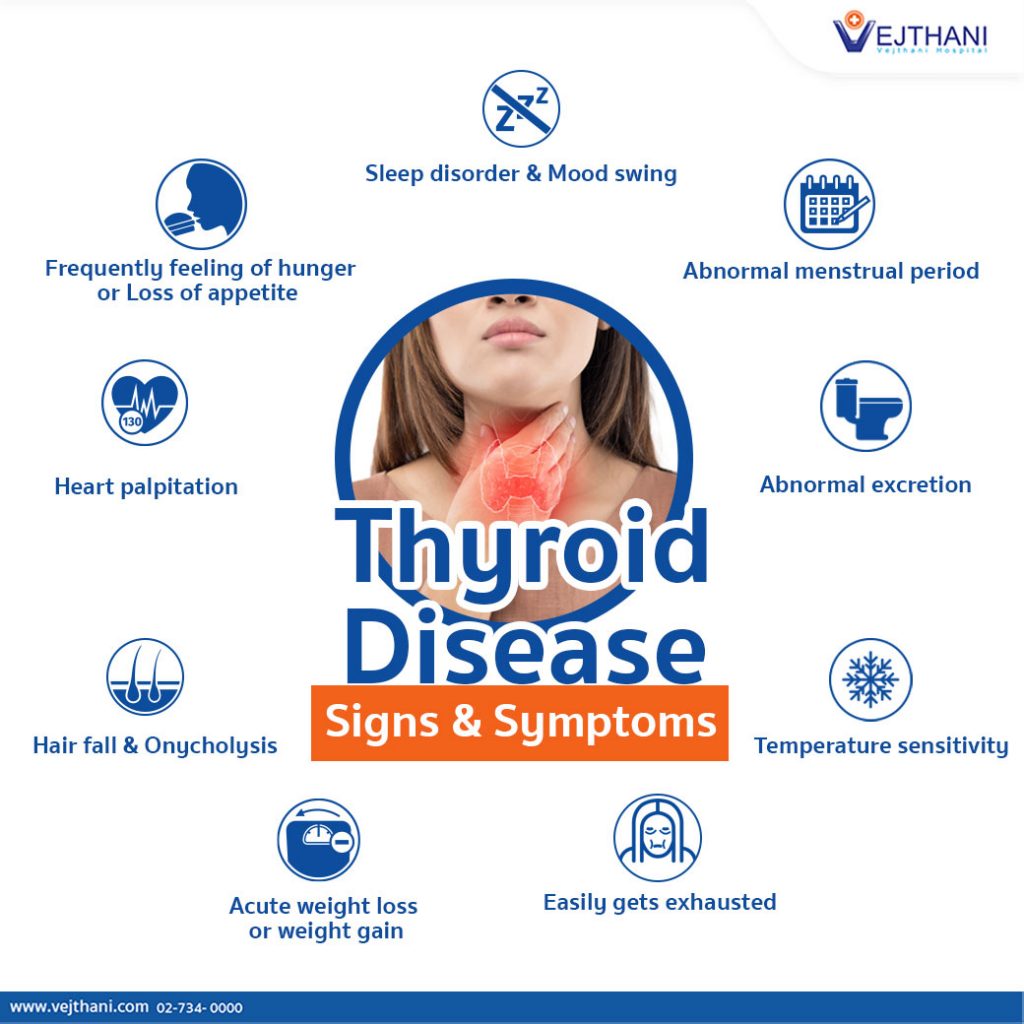Signs of Thyroid Diseases
The thyroid gland is a butterfly-shaped organ located in the neck. It is responsible for the production of thyroid hormones

Do you experience abnormal metabolism, mood swing, and hair fall? These symptoms are signs of thyroid disease. You should seek medical diagnosis and treatment immediately in order to prevent the upcoming complications.
The thyroid is the biggest endocrine gland in the human body, it is located in the foreside of the neck under the Adam’s apple. Thyroid is a butterfly-shape gland, it produces thyroid hormone that is responsible for the regulation of metabolism, nerve, body temperature, and mood. Besides these mentioned, it’s also related to heart’s function, bones, and muscles.
Dr. Aroon Kongchoo, an endocrinology and metabolism specialist of Vejthani Hospital explained that thyroid disease can be divided into 2 types which are Hyperthyroidism or also known as Thyrotoxicosis or Overactive Thyroid, and Hypothyroidism or known as Underactive Thyroid. Hyperthyroidism produces excess thyroid hormone which leads to several abnormalities, such as excessive sweat, moody, weight loss, heart attack, and even death in severe cases. Hypothyroidism produces fewer thyroid hormone than the body’s needs which leads to Hashimoto’s Thyroiditis that causes getting exhaustion easily, frequently feeling sleepy, grain weight easily, and hair fall.
“The cause of Thyroid disease is unclear, but it’s related to genetic and usually found in female rather than male. Thyroid disease may occur in every age but usually occurs in people aged between 30 – 60 years old. For precise diagnosis, the doctor will start from history taking, body examination, and blood test to check thyroid hormonal levels. After diagnosis, the doctor will consider providing medical treatment with oral medicines, but for the patients who have hyperthyroidism, the radioactive iodine may be needed for additional treatment in order to permanently atrophy the thyroid gland in case the general medication did not work well or the patients is allergic to the medication. Besides hyperthyroidism and hypothyroidism, there is another disease that is related to the thyroid gland, it’s called Thyroid Enlargement or also known as Goiter. Although goiter is usually painless, it can cause difficulties when swallowing and breathing. If there is a tumor in the thyroid gland, there is a 4 – 5 % chance that the tumor will be cancerous, thus, the doctor might consider providing surgical treatment which has 3 options, there are open-surgery, minimally invasive surgery, and endoscopic surgery through the oral cavity. But if it’s not cancerous, there is no need to undergo the surgery. However, it depends on the size of the tumor, the symptoms, and the doctor’s consideration.” said, Dr. Aroon.
You can do self-observation by checking if you have any of the following symptoms:
However, some patients might not have noticeable symptoms, but it can be detected by undergoing the blood test or annual health checkup. If you are suspected to have thyroid disease, you should receive the medical diagnosis and proper treatment immediately.
